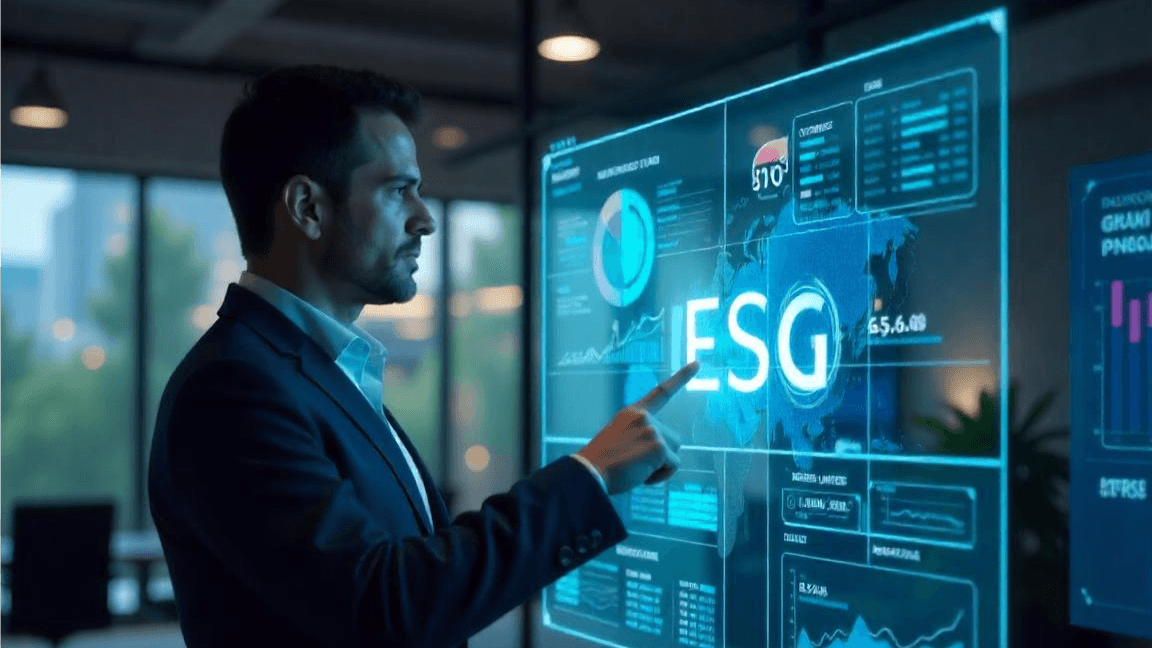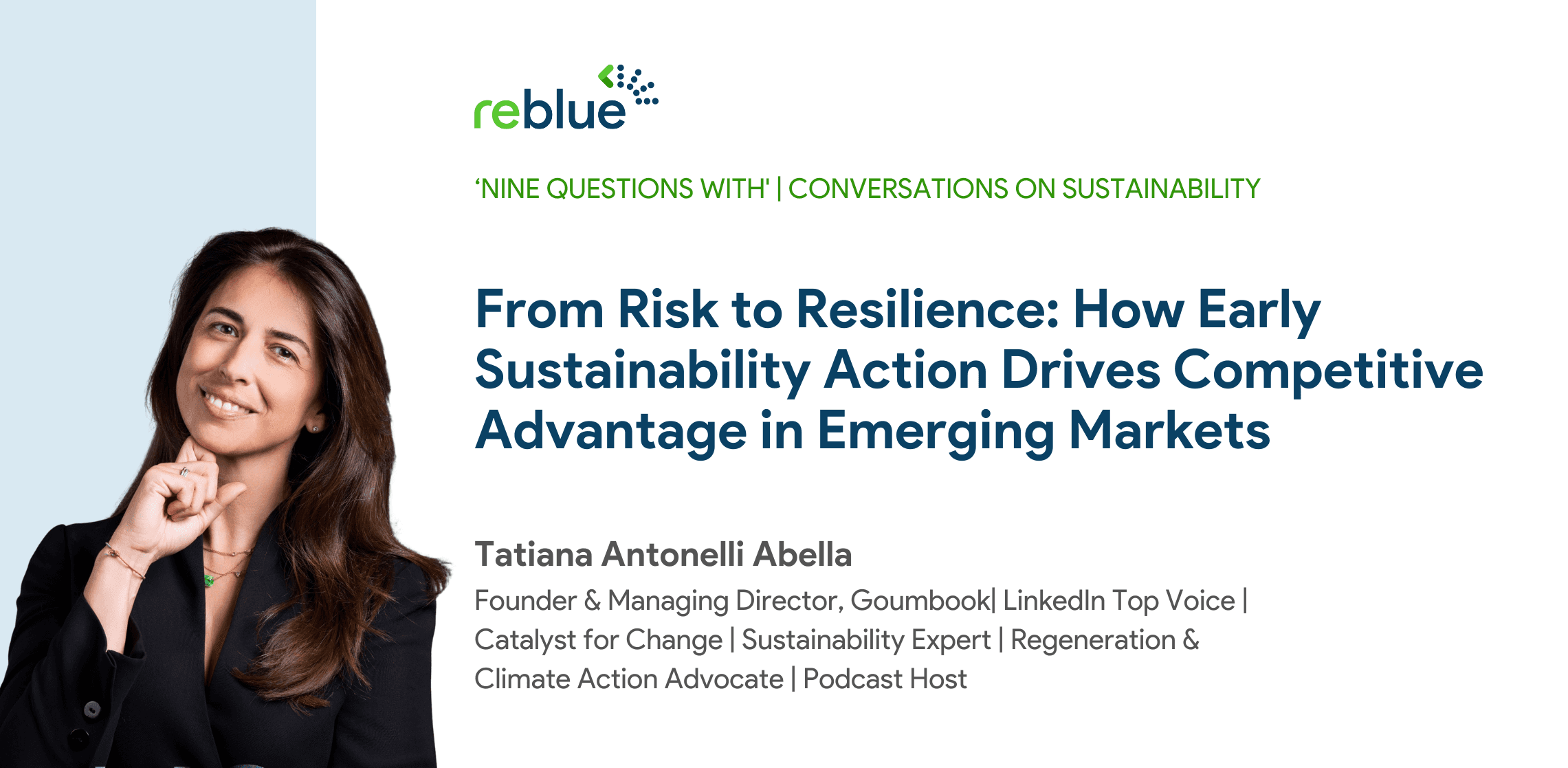Back to Blog
Share Post:



AI-Powered ESG Intelligence: How Market Leaders Are Revolutionizing Sustainability Benchmarking
In an era where environmental, social, and governance (ESG) performance increasingly drives market value, leading organizations are fundamentally transforming their approach to sustainability benchmarking. According to Morningstar's 2023 Sustainable Funds Report, sustainable fund assets reached $2.5 trillion globally by the end of 2022, demonstrating the growing importance of ESG performance in investment decisions.
The Strategic Imperative of ESG Benchmarking
The landscape of sustainability reporting has evolved from a voluntary disclosure practice to a strategic necessity. According to PwC's 2022 Global Investor Survey, 81% of investors consider ESG performance in their investment decisions, with 75% stating they would be willing to sacrifice short-term profitability for sustainable long-term value creation.
Market Leaders Setting the Pace
Several global organizations have demonstrated verifiable leadership in ESG benchmarking and performance:
Microsoft's Climate Innovation
Established a $1 billion climate innovation fund
Committed to being carbon negative by 2030
Implemented mandatory emissions reporting requirements for suppliers
Achieved 100% renewable energy for operations in 2021 (Source: Microsoft Environmental Sustainability Report 2022)
Unilever's Sustainable Business Model
Achieved 100% renewable grid electricity across operations (2019)
Reduced production waste per tonne by 96% since 2008
Reached zero waste to landfill across global factory network (Source: Unilever Annual Report 2022)
The Evolution of ESG Benchmarking
Traditional vs. Modern Approaches
Traditional ESG benchmarking relied primarily on:
Annual sustainability reports
Manual data collection
Limited peer comparison capabilities
Static reporting frameworks
Business Impact
Research from NYU Stern Center for Sustainable Business (2021) found that:
58% of sustainability-related business practices resulted in positive financial outcomes
Companies with strong ESG performance demonstrated lower cost of capital
Sustainability initiatives correlated with improved operational efficiency
Emerging Solutions in the Market
As organizations navigate these challenges, the market has responded with innovative AI-powered solutions to address the complexity of ESG benchmarking. Among these emerging tools is SustainSwift, which represents a new category of GRI-certified AI solutions focused on automating sustainability intelligence.
When evaluating modern ESG benchmarking solutions, organizations should look for:
Automated data collection across multiple frameworks (GRI, SASB, TCFD)
Real-time peer comparison capabilities
Custom clustering options for precise industry analysis
Integration with existing reporting systems
AI-powered insight generation
Third-party certifications and compliance with reporting standards
The key is selecting solutions that not only streamline the benchmarking process but also ensure accuracy and reliability in sustainability reporting.
Strategic Implementation Framework
1. Materiality Assessment
The Global Reporting Initiative (GRI) Standards emphasize starting with a comprehensive materiality assessment. BlackRock's 2023 Investment Stewardship Report highlights how leading companies are:
Identifying industry-specific ESG priorities
Engaging stakeholders systematically
Aligning sustainability goals with business strategy
2. Framework Integration
According to KPMG's Survey of Sustainability Reporting 2022:
96% of G250 companies report on sustainability performance
80% align with multiple reporting frameworks (GRI, SASB, TCFD)
71% include sustainability information in annual financial reports
Case Studies: Industry Giants Leading ESG Intelligence
Walmart Sustainability
Achievements verified through their 2023 ESG Report:
Reduced Scope 1 and 2 emissions by 16.5% since 2015
Diverted 80% of waste from landfills globally
Sourced 46% of electricity from renewable sources
Apple's Environmental Progress
Documented in their 2023 Environmental Progress Report:
Carbon neutral for corporate operations since 2020
100% renewable energy for all facilities
Over 225 suppliers committed to 100% renewable energy
Future Trends
Based on the International Energy Agency's World Energy Outlook 2023:
Renewable energy investments will exceed $1.7 trillion annually by 2025
Carbon pricing mechanisms will cover 30% of global emissions by 2025
Energy efficiency improvements will drive 40% of emissions reductions needed by 2030
Strategic Recommendations
Drawing from McKinsey's 2023 ESG Report:
Integrate ESG metrics into core business strategy
Invest in robust data collection and verification systems
Build internal capacity for sustainability analytics
Engage stakeholders through transparent reporting
Challenges and Ethical Implications
The integration of AI with ESG practices offers significant advantages, but it also brings challenges and ethical considerations that must be proactively managed. Key aspects include:
Data Privacy and Security: AI relies on extensive datasets, making it critical to prioritize data privacy and security. Organizations must comply with stringent data protection laws to ensure the safety of sensitive information.
Algorithmic Bias: The effectiveness of AI depends on the quality of the data it is trained on. Companies need to take deliberate steps to avoid reinforcing existing biases that could undermine the fairness of ESG initiatives.
Transparency and Accountability: As AI increasingly influences ESG strategies, organizations must maintain transparency regarding their AI usage and ensure they remain accountable for the outcomes of AI-driven decisions.
Conclusion
The evolution of ESG benchmarking reflects a broader transformation in how businesses measure and create value. Organizations that leverage advanced analytics for ESG intelligence are better positioned to meet increasing stakeholder expectations and regulatory requirements while capturing competitive advantages.

AI-Powered ESG Intelligence: How Market Leaders Are Revolutionizing Sustainability Benchmarking
In an era where environmental, social, and governance (ESG) performance increasingly drives market value, leading organizations are fundamentally transforming their approach to sustainability benchmarking. According to Morningstar's 2023 Sustainable Funds Report, sustainable fund assets reached $2.5 trillion globally by the end of 2022, demonstrating the growing importance of ESG performance in investment decisions.
The Strategic Imperative of ESG Benchmarking
The landscape of sustainability reporting has evolved from a voluntary disclosure practice to a strategic necessity. According to PwC's 2022 Global Investor Survey, 81% of investors consider ESG performance in their investment decisions, with 75% stating they would be willing to sacrifice short-term profitability for sustainable long-term value creation.
Market Leaders Setting the Pace
Several global organizations have demonstrated verifiable leadership in ESG benchmarking and performance:
Microsoft's Climate Innovation
Established a $1 billion climate innovation fund
Committed to being carbon negative by 2030
Implemented mandatory emissions reporting requirements for suppliers
Achieved 100% renewable energy for operations in 2021 (Source: Microsoft Environmental Sustainability Report 2022)
Unilever's Sustainable Business Model
Achieved 100% renewable grid electricity across operations (2019)
Reduced production waste per tonne by 96% since 2008
Reached zero waste to landfill across global factory network (Source: Unilever Annual Report 2022)
The Evolution of ESG Benchmarking
Traditional vs. Modern Approaches
Traditional ESG benchmarking relied primarily on:
Annual sustainability reports
Manual data collection
Limited peer comparison capabilities
Static reporting frameworks
Business Impact
Research from NYU Stern Center for Sustainable Business (2021) found that:
58% of sustainability-related business practices resulted in positive financial outcomes
Companies with strong ESG performance demonstrated lower cost of capital
Sustainability initiatives correlated with improved operational efficiency
Emerging Solutions in the Market
As organizations navigate these challenges, the market has responded with innovative AI-powered solutions to address the complexity of ESG benchmarking. Among these emerging tools is SustainSwift, which represents a new category of GRI-certified AI solutions focused on automating sustainability intelligence.
When evaluating modern ESG benchmarking solutions, organizations should look for:
Automated data collection across multiple frameworks (GRI, SASB, TCFD)
Real-time peer comparison capabilities
Custom clustering options for precise industry analysis
Integration with existing reporting systems
AI-powered insight generation
Third-party certifications and compliance with reporting standards
The key is selecting solutions that not only streamline the benchmarking process but also ensure accuracy and reliability in sustainability reporting.
Strategic Implementation Framework
1. Materiality Assessment
The Global Reporting Initiative (GRI) Standards emphasize starting with a comprehensive materiality assessment. BlackRock's 2023 Investment Stewardship Report highlights how leading companies are:
Identifying industry-specific ESG priorities
Engaging stakeholders systematically
Aligning sustainability goals with business strategy
2. Framework Integration
According to KPMG's Survey of Sustainability Reporting 2022:
96% of G250 companies report on sustainability performance
80% align with multiple reporting frameworks (GRI, SASB, TCFD)
71% include sustainability information in annual financial reports
Case Studies: Industry Giants Leading ESG Intelligence
Walmart Sustainability
Achievements verified through their 2023 ESG Report:
Reduced Scope 1 and 2 emissions by 16.5% since 2015
Diverted 80% of waste from landfills globally
Sourced 46% of electricity from renewable sources
Apple's Environmental Progress
Documented in their 2023 Environmental Progress Report:
Carbon neutral for corporate operations since 2020
100% renewable energy for all facilities
Over 225 suppliers committed to 100% renewable energy
Future Trends
Based on the International Energy Agency's World Energy Outlook 2023:
Renewable energy investments will exceed $1.7 trillion annually by 2025
Carbon pricing mechanisms will cover 30% of global emissions by 2025
Energy efficiency improvements will drive 40% of emissions reductions needed by 2030
Strategic Recommendations
Drawing from McKinsey's 2023 ESG Report:
Integrate ESG metrics into core business strategy
Invest in robust data collection and verification systems
Build internal capacity for sustainability analytics
Engage stakeholders through transparent reporting
Challenges and Ethical Implications
The integration of AI with ESG practices offers significant advantages, but it also brings challenges and ethical considerations that must be proactively managed. Key aspects include:
Data Privacy and Security: AI relies on extensive datasets, making it critical to prioritize data privacy and security. Organizations must comply with stringent data protection laws to ensure the safety of sensitive information.
Algorithmic Bias: The effectiveness of AI depends on the quality of the data it is trained on. Companies need to take deliberate steps to avoid reinforcing existing biases that could undermine the fairness of ESG initiatives.
Transparency and Accountability: As AI increasingly influences ESG strategies, organizations must maintain transparency regarding their AI usage and ensure they remain accountable for the outcomes of AI-driven decisions.
Conclusion
The evolution of ESG benchmarking reflects a broader transformation in how businesses measure and create value. Organizations that leverage advanced analytics for ESG intelligence are better positioned to meet increasing stakeholder expectations and regulatory requirements while capturing competitive advantages.

AI + Sustainability
Dec 16, 2024
Share Post:


Read More
Reblue Ventures
We aim to make sustainability simply smart business. Through research and partnerships, we develop pragmatic solutions that reveal the immense uncaptured value in sustainable operations.
Reblue Ventures
We aim to make sustainability simply smart business. Through research and partnerships, we develop pragmatic solutions that reveal the immense uncaptured value in sustainable operations.
Reblue Ventures
We aim to make sustainability simply smart business. Through research and partnerships, we develop pragmatic solutions that reveal the immense uncaptured value in sustainable operations.







